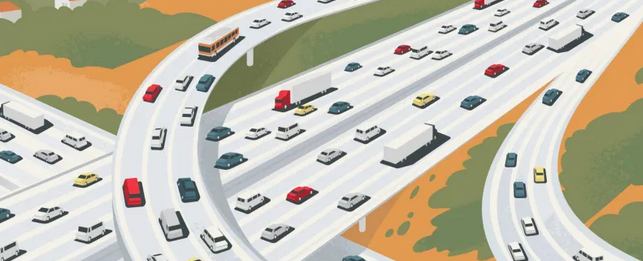Today, the Gateway Cities Council of Governments (GCCOG) will consider Metro's proposed Highway Program Modernization, which would allow cities more flexibility in how Metro street monies are spent. The proposal is on the agendas of the GCCOG's 4:30 p.m. Transportation Committee and 6 p.m. Board of Directors meetings. Via Twitter, Downey's Alexandria Contreras issued an action alert for people to comment on the proposal.
For readers unfamiliar with L.A. County's Council of Governments, the COGs are organizations that represent L.A. County subregions, generally bringing together various cities. The COGs are involved in various planning efforts, especially for projects that span more than one jurisdiction. Their transportation planning authority is baked in to Metro's county-wide authority, especially regarding how Metro sales tax monies are spent. [See Investing in Place's explanation of COGs and subregions for more detail.]
L.A. County is broken up into nine subregions.
The Gateway Cities COG represents the southeast portion of the county - from Long Beach to Vernon to Montebello to Whittier to La Mirada.
Metro recently proposed allowing new flexibility for Highway Program funds, which are used for a fairly broad range of projects, including many projects on city streets. Based on wording in voter-approved Metro sales tax Measures M and R, highway funding was effectively prohibited from paying for transit, walk, or bike components of projects. The new Metro proposal would not mandate redirection of any highway funding, but would allow funding to go to features that support transit, walking, and bicycling, largely as components of a complete streets project.
As ActiveSGV has noted, "When Metro Highway Funding is used on local streets, it impacts all roadway users, including older adults, children, and mobility-impaired residents who walk along and across streets to access local schools, community sites, and businesses. Transportation “improvements” should not make local streets more difficult or dangerous to cross by foot."
Gateway Cities COG staff have drafted a COG comment letter (see pages 9-13 of the GCCOG Transportation Committee agenda) which is critical of many aspects of the Metro proposal.
The COG letter pleads exceptionalism: "Unlike other subregions, the Gateway Cities area is severely impacted by roadways (freeways and highways) that were designed in the 1950s and 1960s and do not conform to modern traffic demands or design safety standards. Furthermore, the regional and national impacts of freight movement in the Gateway Cities still need to be addressed."
GCCOG staff then call to keep doing things they way they're used to in order "to maintain the integrity of freeway corridor-based plans that have been undertaken to address the well-defined articulated needs of each of the corridors." Further they assert that the flexibility proposal has "the potential to diminish the effectiveness of individual highway corridor projects by broadly spreading funding or allowing for the diversion of funding to other modes." Note that inside the GCCOG borders, Metro's highway plans and projects - especially Metro's 605 Freeway Corridor Improvements Project - would demolish hundreds of homes while worsening congestion and pollution.
COG staff then present a selective view of how Metro promoted sales tax measures. Though many voters perceived these taxes as being for transit, Metro promoted them as broadly improving transportation across many modes. GCCOG staff apparently didn't get the memo. Their letter focuses on language supporting driving, claiming that "both sales tax measures were 'sold' in large part by promising to improve traffic congestion" and that "the term 'Improve traffic flow' is prominent in the preambles and ballot language for both Measures R & M."
The COG letter is mostly critical of Metro's proposal, but does include faint-praise acknowledgement that flexibility could be "beneficial to providing creative solutions to traffic congestion" and that "local benefits may arise from a multi-modal approach."
Though the COG staff remain fixated on the "integrity" of stale "freeway plans," it is not clear that the COG city leaders do. Long Beach Mayor Robert Garcia (who represents the Gateway Cities on the Metro board, has called for 605 Freeway funds to instead “be reinvested in the Gateway Cities communities along this corridor… for clean air, active transportation, water delivery and drainage, and roadway improvements.” Long Beach, along with many other Gateway Cities, suffers the harmful impacts of Southern California highways.







